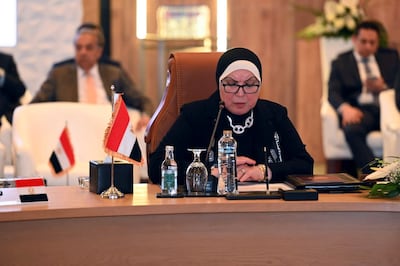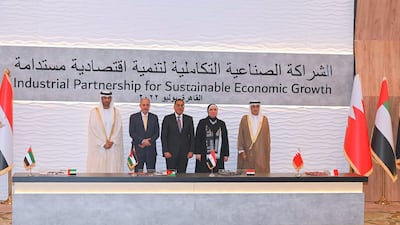Bahrain has joined the Industrial Partnership for Sustainable Economic Development, boosting the industrial manufacturing value add of the alliance to more than $112.5 billion.
Bahrain joined the UAE, Egypt and Jordan at the second higher committee meeting of the industrial partnership in Cairo.
Dr Nevin Gamea, Egypt's Minister of Trade and Industry, Dr Sultan Al Jaber, UAE Minister of Industry and Advanced Technology, and Yousef Al Shamali, Jordanian Minister of Industry, Trade and Supply, were also joined by Zayed Al Zayani, Minister of Industry and Commerce of Bahrain, at the meeting, the UAE Ministry of Industry and Advanced Technology said on Monday.
Bahrain, a major producer of raw aluminium and iron ore, boasts a strong industrial sector with more than 9,500 companies and 55,000 employees and $4.3bn in industrial foreign direct investment.
The partnership aims to establish large joint industrial projects, create job opportunities, contribute to increasing economic output, diversify the economies of the partner countries, support industrial production and increase exports, the statement said.
“This partnership is key to ensuring value and supply chains, reaching industrial self-sufficiency, and creating more jobs,” Ms Gamea said.
“We welcome Bahrain to join this partnership, which will help maximise the benefit of the industrial capabilities of the four countries.”

The industrial partnership is vital to counter the economic impact of global crises and underscores the importance of private sector engagement in sustainable development for the Arab world, she added.
The industrial partnership is expected to boost the gross domestic product of member countries by $809bn. The four-member alliance now represents the world's largest combined raw aluminium exporter with an aggregate value of $6.76bn, the statement said.
The industrial partnership is open to “any party who wishes to contribute to the development of the industrial sector, promote integration across industries and leverage the competitive advantages offered by the UAE, Egypt, Jordan and now Bahrain”, Dr Al Jaber said.
“Our combined efforts and teamwork will enhance the development of the companies and countries involved in this partnership by reducing costs, safeguarding supply chains, creating more jobs, boosting self-sufficiency, planning for the future and applying the latest technology,” he added.
In May, the UAE, Egypt and Jordan signed the industrial partnership pact, which is aimed at boosting sustainable growth and exploring opportunities for joint investments in priority sectors.
A $10bn investment fund has been allocated and is being managed by Abu Dhabi's holding company ADQ to accelerate work on the partnership across five priority sectors, Dr Al Jaber said at the time.
Emirates Development Bank will back the initiative, offering a range of flexible direct and indirect financing solutions to UAE-based companies seeking to unlock the opportunities of the new partnership.
This includes capital expenditure financing for expansion or facility upgrades in addition to greenfield and brownfield project financing. The bank will also offer financial support for integrating advanced technologies, and digitisation of operations and investments into alternative, renewable or clean energy sources.
The partnership identified five sectors of mutual interest, including petrochemicals; metals, minerals and downstream products; textiles; pharmaceuticals; and agriculture, food and fertilisers.
On Monday, the higher committee approved the partnership’s joining guide along with the minutes of the committee’s first meeting. It reviewed reports on priority sectors and was briefed by chief executives of major industrial companies.

The committee, which received 87 industrial project proposals focused on fertilisers, agriculture and food sectors, reviewed and moved 12 projects worth $3.4bn into the feasibility study stage.
In the next phase, the partnership will focus on the metals, chemicals, plastics, textiles and clothing sectors, according to MoIAT.
The partnership is vital to bolster Arab economic integration. In 2019, UAE, Egypt, Jordan and Bahrain accounted for 30 per cent of the Middle East and North Africa’s industrial contribution to GDP, totalling $65bn worth of industrial exports.
The bloc of four nations has a combined population of 122 million, accounting for 27 per cent of the Mena region and 49 per cent of its youth aged under 24.
The value of FDI in the UAE, Egypt and Jordan reached $151bn between 2016-2020, accounting for about 42 per cent of new FDI in the Middle East. The total value of the countries’ exports stood at $433bn in 2019, while imports amounted to approximately $399bn, according to the statement.
Substantial progress has been achieved in the two months since the launch of the partnership in Abu Dhabi, officials said.
The second meeting highlighted the “political and economic ties binding our nations, and ushers in a new era of joint action and effective economic integration with tangible impacts”, Mr Al Shamali said.
Bahrain's participation in the industrial alliance is a step forward in Arab economic integration and it follows “continuous success and growth in the industrial sector over the past decades”, as the kingdom has focused on diversifying its economy and reducing its reliance on hydrocarbons, Mr Alzayani said.


